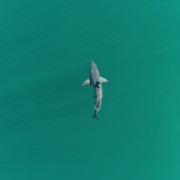- Science News
- Environment
- A dog’s life: James A Serpell and his investigation into the origin story of mankind’s best friend
A dog’s life: James A Serpell and his investigation into the origin story of mankind’s best friend
By Colm Gorey, Frontiers science writer/Prof James Serpell, University of Pennsylvania

Prof James A Serpell, University of Pennsylvania. Image: University of Pennsylvania
Two distinctly different stories have been created to explain how fearsome, wild wolves were first domesticated by humans, according to Prof James A Serpell of the University of Pennsylvania and the Wallis Annenberg PetShape Leadership Institute. However, in the open access journal Frontiers, he recently published a paper investigating the truth of these claims.
Despite being considered mankind’s best friend, the ancestors of modern dogs were a lot less welcoming to human owners. However, trying to trace the timeline of when early humans first domesticated wild wolves to serve their needs has proven difficult.
One of the most prevalent origin stories in scientific literature suggests the ‘commensal scavenger hypothesis’. This posited that wolves essentially domesticated themselves by invading ancient human settlements in search of animal remains and other edible waste discarded by hunter-gatherers.
Over time, tolerance by humans gave a selective advantage to the bolder, less fearful wolves, which then diverged from the ancestral population as they adapted to the new scavenging niche.
An alternative hypothesis – sometimes referred to as the pet keeping or cross-species adoption hypothesis – postulates that Paleolithic peoples were inclined to capture, adopt and rear infant mammals, such as wolf pups. Eventually, habitual human nurturing behavior provided the basis for the evolution of a cooperative social system involving both species.
However, in a paper recently published to Frontiers in Veterinary Science, Prof James A Serpell of the University of Pennsylvania found that the commensal scavenger hypothesis is untenable based on what is known about recent and ancient hunter-gatherer societies.
Instead, wolf domestication was predicated on the establishment of cooperative social relations between humans and wolves based on the early socialization of wolf pups.
Serpell is a professor of ethics and animal welfare at the University of Pennsylvania School of Veterinary Medicine, director of the university’s Center for the Interaction of Animals and Society and a fellow of the Wallis Annenberg PetSpace Leadership Institute.
Because open access and sharing research is part of Frontiers’ mission, we want to give researchers the voice to express themselves and their research with more creativity and freedom than they otherwise would have in publishing an academic paper.
If you’ve recently published your paper with Frontiers and believe you have a great story to tell, then send an email to press@frontiersin.org with ‘Frontier Scientists’ and your name in the subject line.
What inspired you to become a researcher?
Just an inexhaustible fascination with animals and animal behavior. My decision to pursue a research career was triggered by a lorikeet (parrot) I rescued from some children in a village in Indonesia. His behavior intrigued me so much, I wrote grant to study the behavior of lorikeets for my PhD.
Can you tell us about the research you’re currently working on?
I’m working on a variety of projects and collaborations at the moment, broadly focused on the behavior and welfare of companion animals. I am also interested in the history, anthropology, and psychology of human-animal relationships.
In your opinion, why is your research important?
The question of how humans identify with, relate to, and care about other animals has huge implications for global biodiversity and the future of the planet, as well as being directly relevant to the welfare of the individual animals in our care.
Are there any common misconceptions about this area of research?
Currently, there is a widespread misconception that human-companion animal relationships are universally beneficial and positive. This is manifestly untrue.
The key to addressing this false belief is to use high quality research to understand why some of these relationships are beneficial while others are at best neutral, or at worst, detrimental to both people and their animals.
What are some of the areas of research you’d like to see tackled in the years ahead?
I would like to see more attention directed toward understanding the development of attitudes and behavior towards animals and nature during childhood. People’s relationships with companion animals are profoundly impacted by the behavior of the animals, sometimes leading to them being abandoned, relinquished to shelters, or euthanized by veterinarians. Further research is needed on the etiology of behavioral problems in cats and dogs.
How has open science benefited the reach and impact of your research?
My most recent publication in Frontiers was part of a research topic with the Wallis Annenberg PetSpace Leadership Institute.
Their mission is to help further the understanding of the human-animal bond to a broad audience. By publishing in open access journals, my work is available to a far wider range of people and organizations outside of the ‘academy’.
If you have recently published your research with Frontiers and believe you have a story to tell, then you might feature as part of our new Frontier Scientists series! Send an email with the subject line ‘Frontier Scientists’ and your name to press@frontiersin.org , as well as details on what your most recent research was about.







